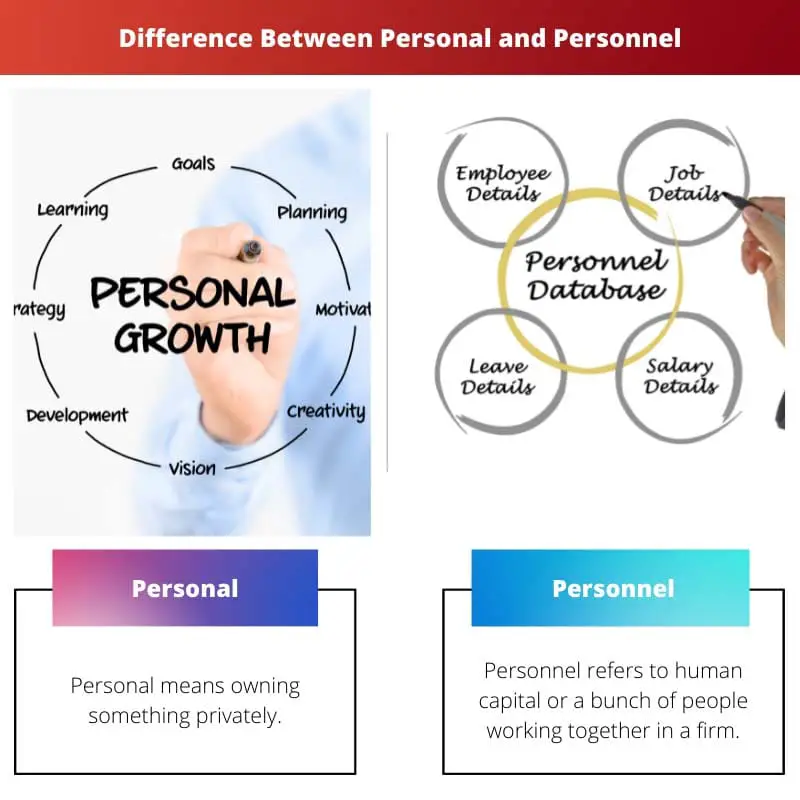Personal and personnel are two of them. However, to understand each of the words clearly, it is more important to know how they differ.
The use of these words is about either individuals or people. Distinctive differences exist between the two terms, personal and personnel. This article would clarify how personnel is different from personnel.
Key Takeaways
- “Personal” pertains to an individual’s private life, while “Personnel” refers to a group of employees working in an organization.
- “Personal” is used to describe the emotions or characteristics of a person, while “Personnel” is used in the context of staffing and workforce management.
- “Personal” is an adjective used to describe something that belongs to or concerns a specific person. At the same time, “Personnel” is a noun used to refer to the people employed by an organization.
Personal vs. Personnel
The term ‘personal’ can be used as an adjective or a noun. This term is used for a single person. Personal is referred to as a singular form. This term is used for personally or privately owned things. The term ‘personnel’ is always used as a noun. This term can be used for a group of people. Personnel is referred to as a plural form.

The word personal means owning something privately. When an opinion is shared, it is told that it is someone’s opinion. Subjective refers to a single human. The use of personal is done as an adjective.
Personnel refers to human capital or people working together in a firm. Personnel use comes into use while referring to the working human capital or employees of a firm or organization. Personnel is plural.
Comparison Table
| Parameters of Comparison | Personal | Personnel |
|---|---|---|
| Meaning | Personal means owning something privately. | Personnel refers to human capital or people working together in a firm. |
| Pronunciation | Person-uhl | Perso-nell |
| Use | When an opinion is shared, it is told that it is someone’s opinion. | Personnel use comes into use while referring to the working human capital or employees of a firm or organization. |
| Nature | Singular | Plural |
| Reference with No. of humans | Personal refers to a single human. | Personnel refers to a bunch of humans. |
| Parts of speech | Adjective | Noun |
| Also used as | Personal can be used as an adjective and sometimes as a noun in personals. | Personnel is always considered a noun. |
What is Personal?
When people discuss personal matters, personal belongings, and personal baggage, it means that it is really being referred to as something which is theirs and solely belongs to them. Thus, the term personal can be used synonymously with private.
However, it relates to only an individual. Therefore, we can not say personal training but personnel training. Similarly, not personal belongings but personal belongings. Although, using personal is done by considering it as an adjective.

What is Personnel?
Personal refers to a bunch of people that work together for a company or organization. Personnel is used as a plural noun. When a group of people works for a firm or business, it is called personnel.
For a company, it is essential to have a group of personnel committed to the company’s well-being, success, and profit. In all big organizations, a personnel manager is appointed to oversee all personnel policies.

Main Differences Between Personal and Personnel
- Personal is pronounced as “person-uhl.” Whereas personnel is pronounced as “perso-nell.”
- Personal can be used as an adjective and sometimes as a noun in personals. However, personnel is always considered a noun.

- https://www.tandfonline.com/doi/pdf/10.1080/00220973.1988.11072066
- https://apps.dtic.mil/sti/citations/ADA405421

Negative comment
The comparison table provided made it easier to understand the differences between personal and personnel. Well done!
Yes, it’s really helpful. Made it crystal clear.
Precisely, concise and helpful.
Negative comment
The article provided a very clear explanation with lucid examples.
It is interesting to note the differences based on the context in which each word is used. Great job!
Agreed, and the article does a great job of highlighting that.
The use of examples made it easier to differentiate between the two terms. Great work!
Yes, the examples were really helpful.
I second that.
Informative article, well researched and presented.
Indeed, well written and organized.
The article was both informative and engaging, providing valuable insights into the differences between the two terms.
Good composition. You have done us a great favor by explaining these two confusing terms with such simplicity.
I totally agree with that. The explanations are detailed and clear.
I think examples of the usage would have been helpful.
Disagree, I think the information was well-explained without examples.
You have a valid point.